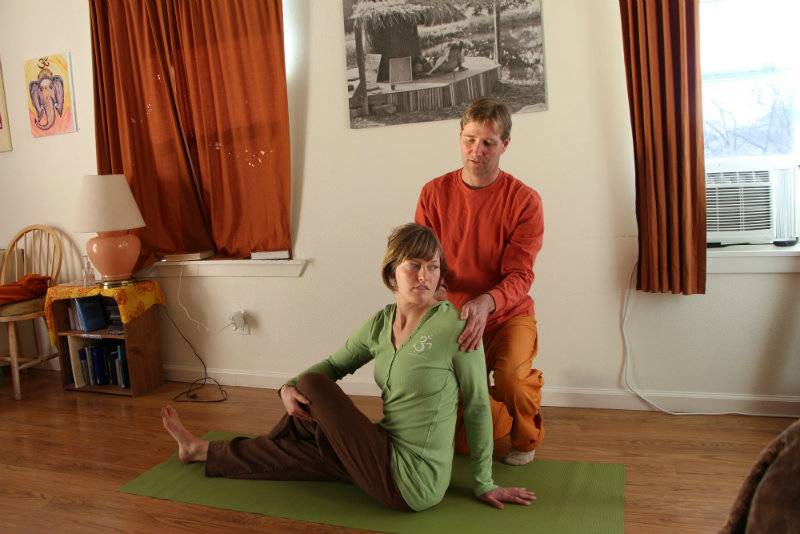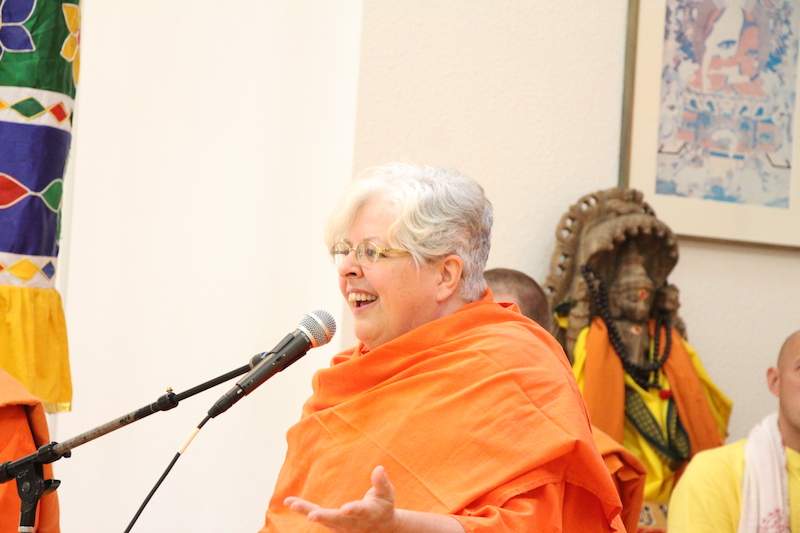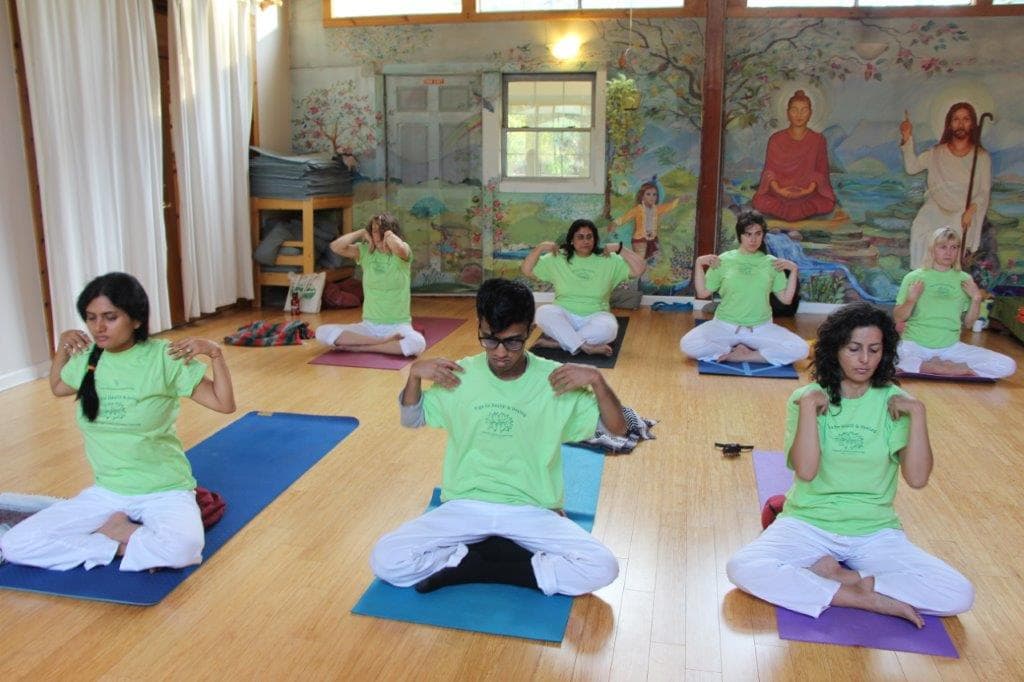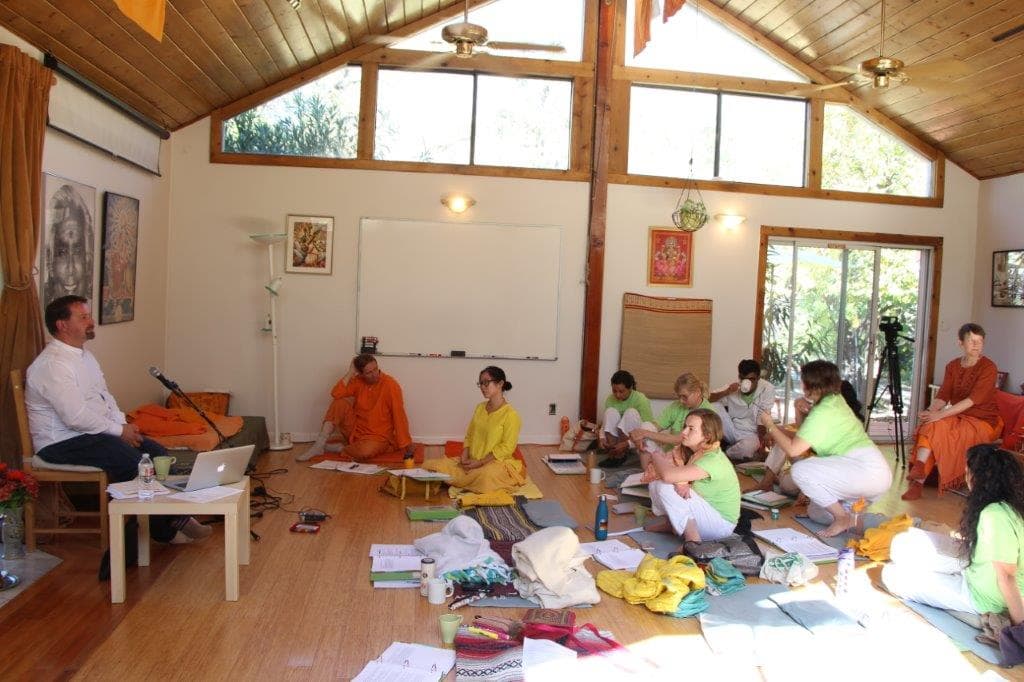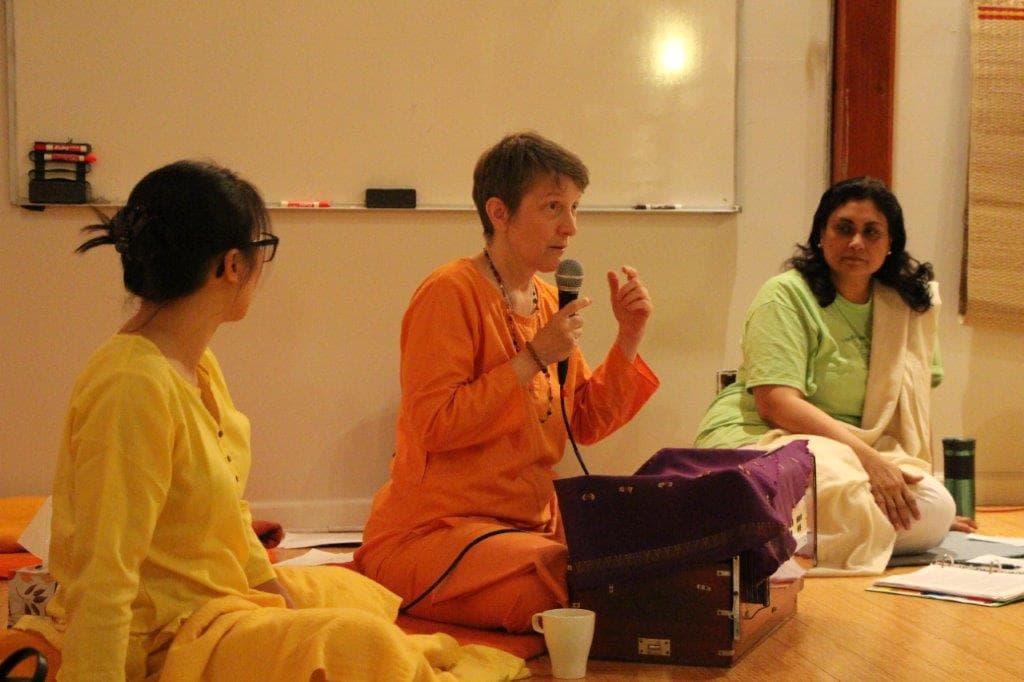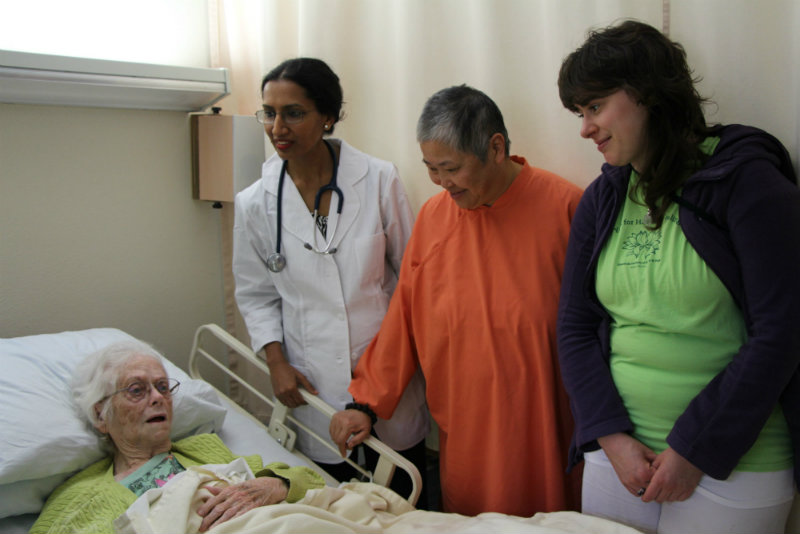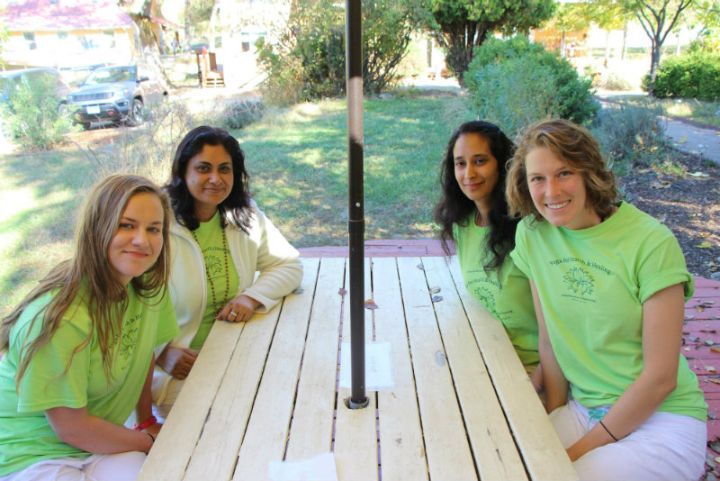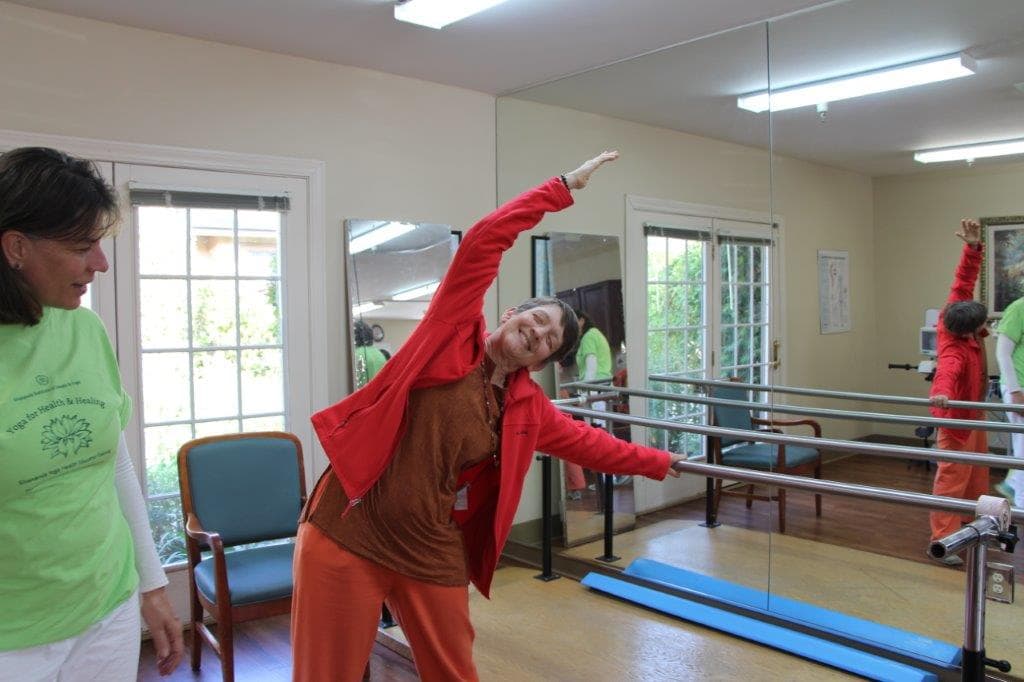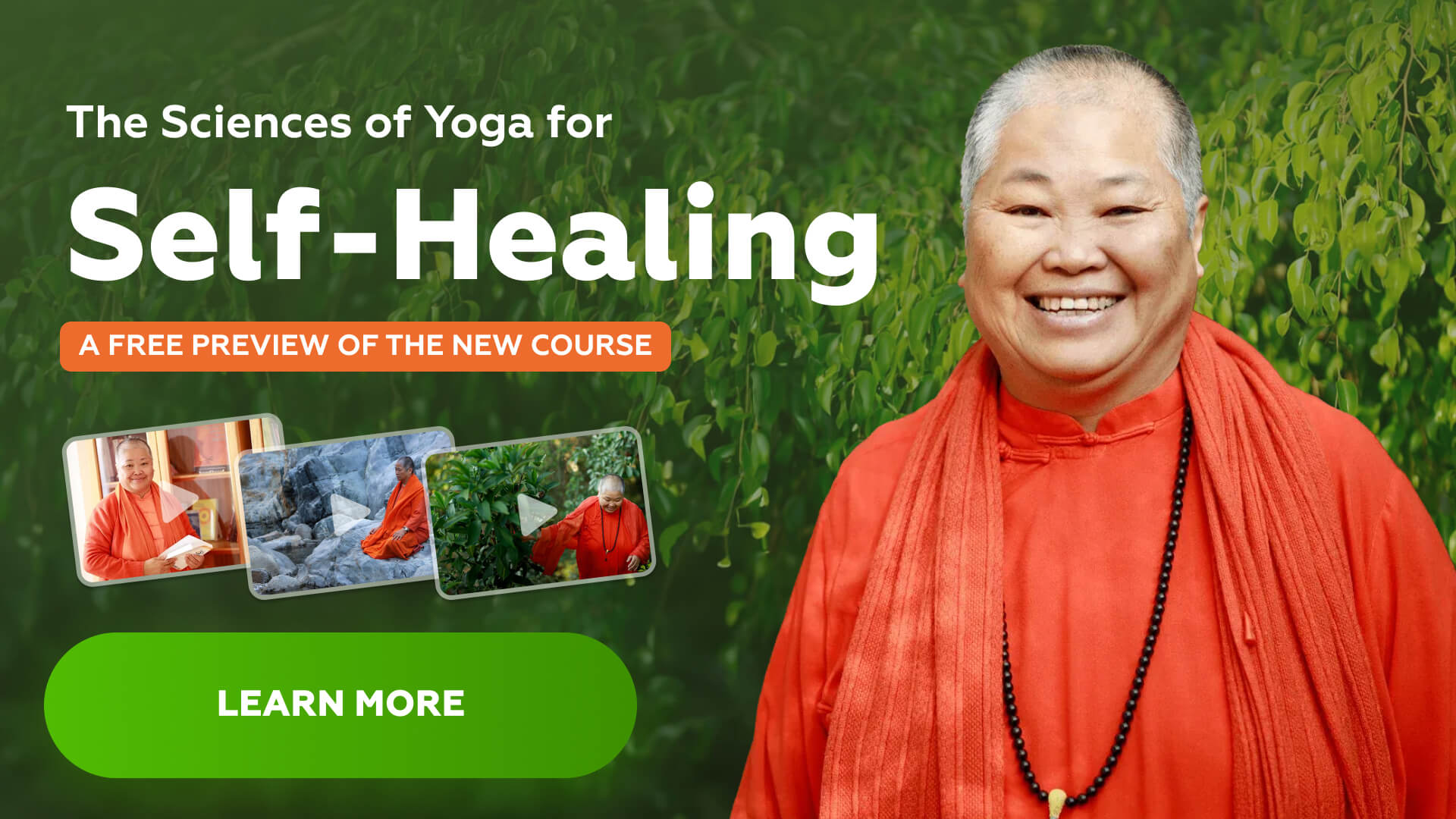Sivananda Yoga Health Educator Training (SYHET)
(800-Hour Yoga Therapy Program)
Learn, Inspire, and Grow. Become a Health Educator.
Overview
Over the course of this 800-hour professional yoga therapy program, the student becomes versed in the therapeutic application of the Five Points of Yoga and the Four Paths of Yoga.
The goal of the Sivananda Yoga Health Educator is to empower participants in their own Self-healing through the practice of asana, pranayama, conscious relaxation techniques, vegetarian diet, positive thinking tools, and meditation practices.
Practical tools, foundation concepts and philosophical knowledge are gained to create the framework for more advanced study as one progresses through the program. Emphasis is placed on understanding the subtler aspects of the causes of disease and stress in the individual.
Common health conditions addressed include chronic stress, respiratory disorders, cardiovascular conditions, diabetes, auto-immune disorders, musculoskeletal conditions, psychology, etc.
Intensive study in Yoga psychology, the therapeutic effects of meditation practice, the theory of karma and disease, counseling techniques based in the Vedic sciences, Ayurveda psychology, anatomy, physiology, and pathology, as well as understanding the root cause of addiction and behaviors are covered in the curriculum. Thus, the Yoga Health Educator has the knowledge and intuitive capacity to be a positive and healthy instrument of healing.
The Sivananda Yoga Farm’s 800-Hour Professional Yoga Health Training is accredited with IAYT.

Once you graduate our accredited 800-hour Professional Yoga Health Educator Training you are eligible to apply for C-IAYT Certification
Student Information Guide
800-hour Professional Yoga Therapy Program
Course Format and Dates
The Sivananda Yoga Health Educator program is structured over two years and meets three times for 17-day in-person residential modules at the Sivananda Yoga Farm in Grass Valley, CA or ONLINE. Each module includes self-study materials with assignments of the program material, concepts, and their application.
Module 1: January 8 – 24, 2026
Yoga and the Mind, Psychology and Mental Health
Module 2: April 15 – 30, 2026
Ayurveda and Healing; Disease Process, Management and Prevention, Anatomy, Physiology, and Pathology
Module 3: October 1 – 17, 2026
Yoga Health Techniques: Therapeutic Application of Asana, Pranayama, and Relaxation
Module 4: Distance Learning Online
Anatomy, Physiology and Pathology/ Biomedical Foundations, Ayurveda and Healing, Therapeutic Relationship
Practicum: Yoga Health Techniques Applied knowledge and techniques to educate individuals and groups under the guidance of a mentor in a medical clinic or yoga center.
Who benefits from this knowledge:
- Yoga teachers
- Health care providers
- Hospitals
- Acupuncture clinics
- Physical therapist and chiropractor offices
- Social workers
- At-risk youth facilities
- Psychologists
- Therapists
- Counselors
- Nurses
- Life coaches
- Corporate wellness programs
- Those with a true passion for health and well-being
Therapeutic Application of Yoga
Be trained in the therapeutic application of Yoga techniques that show positive effects on the following health conditions:
Psychological and nervous system disorders
Health and Lifestyle
Cardiovascular conditions
Metabolic conditions
Respiratory disorders
Musculoskeletal conditions
Special populations
Lack of spiritual health
Videos
Full length documentary about the start of the SYHET program. Produced in 2017.
Video Testimonials
Swami Dharmananda takes time to give us answers to many questions that students have about SYHET.
Case Study of a SYHET counseling session and how to apply the SYHET principles to the case.
Module 1 – Yoga and the Mind, Psychology and Mental Health
Overview
The first module presents an integrated approach to health and healing that is based upon the Yoga philosophy and Yoga psychology, particularly from the Five Points of Yoga for Holistic Health (proper exercise, proper breathing, proper relaxation, proper diet, positive thinking and meditation), combined with techniques from the Four Paths of Yoga to form the foundation of the Yoga Health Educator’s work. Knowledge of western medical and psychological approaches to health and healing prepares the Yoga Health Educator for future collaboration with health care providers.
- Yoga philosophy on consciousness and the Self
- Yoga psychology – (Raja Yoga) and meditation
- The mind and its mechanics
- Five modes of mind and concentration
- Three levels of mind and evolution of consciousness
- Inborn karmic tendencies and subconscious
- Karma, dharma and relationships
- Emotional healing: anger, fears, anxiety, depression, desire, addiction, grief, attachment, stress resilience
- Guidelines for mental health
- Positive thinking techniques according to the four classical paths of Yoga
- Purification: going to the root cause of suffering
- Yoga effects on specific conditions
Foundations and Yoga Philosophy
- Study and practical application of the Five Points of Holistic Yoga for Integral Health and classical Four Paths of Yoga for Health and Well-being to form the foundation of all future teaching within the program. Included will be an overview of the course schedule, plus integration of teaching flow, assignments, grading and details of the practicum.
Raja Yoga
- Yoga Health Educator students will gain practical understanding of the body-mind relationship through the application of specific Hatha Yoga and Raja Yoga techniques. Yoga Health Educator students learn how to train others to recognize the mind’s karmic tendencies and negative behaviors; and further learn how to apply Yoga practices and techniques in response to those tendencies and behaviors to reduce stress and anxiety.
Psychology and Mental Health
Conventional and Alternative Interventions Taught by Swami Sitaramananda, Swami Jnaneswariananda, and Swami Dharmananda
- Raja Yoga is the royal path of mind control and meditation. Yoga Health Educator students learn to apply the classical teachings of the Raja Yoga Sutras in the context of daily life, gain understanding of the workings of the mind, and learn techniques to systematically identify the causes of suffering, design methods and techniques to alleviate suffering; learn methods to help reduce distractions and increase concentration and peace of mind; learn methods to overcome bad habits and addictions by changing existing mental patterns.
Asana Practice
Psychological and Health Benefits Taught by Swami Dharmananda and Swami Adiparashaktiananda
- Yoga Health Educator students delve deeper into the health benefits of practicing yoga poses—physical, psychological, and energetic—learning to apply asana techniques to improve specific systems of the body. Concentration techniques will be included.
Gentle Yoga Training
- Gentle Yoga gives Yoga Health Educator students the necessary training and skills to adapt and modify asanas as needed—due to age, weight, illness, injury or limited flexibility. Workshops will include discussions on the philosophy and psychology of Gentle Yoga and aging, combined with practical hands-on instruction in the application of Yoga techniques to address the special needs of the individual; the philosophy and psychology of Gentle Yoga; experiences of Gentle Yoga; how to work with varied populations, and common ailments associated with back pain, joint pain, bone strength, balance and more.
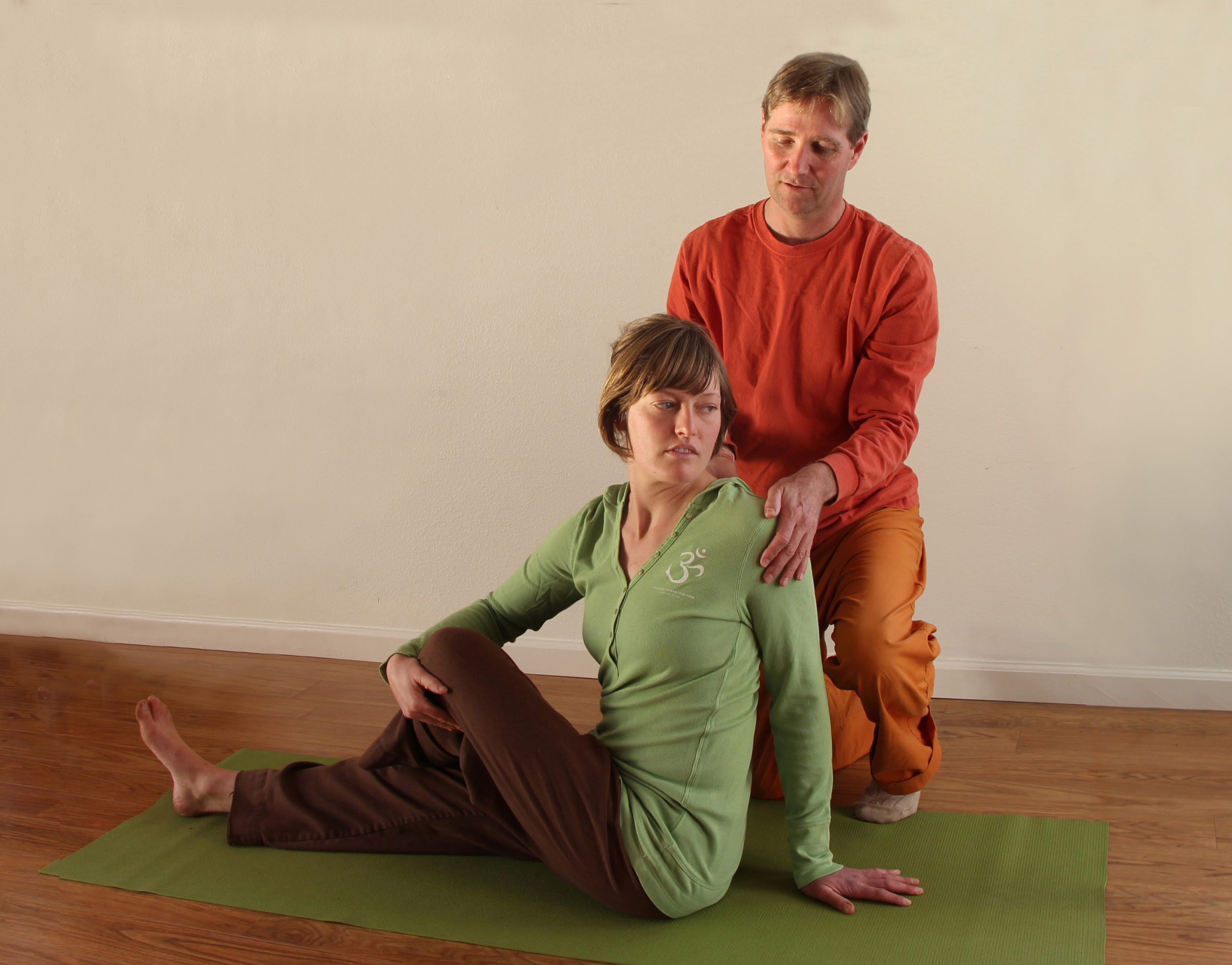
Module 2 – Ayurveda and Healing; Disease Process, Management and Prevention
Overview
The primary focus of study for the Yoga Health Educator in Module 2 is Anatomy and Physiology and Ayurveda and Healing: Disease Process, Management, and Prevention. Here the YHE student gains a detailed understanding of the systems and functions of the physical body; understanding of common ailments and pathologies; and hands-on Yoga Therapy workshops designed to address specific physical conditions. The principles of Ayurveda are introduced to address the causes of disease; provide a framework for understanding health and wellness according to Ayurveda; and to develop strategies and lifestyle practices aligned with Nature and self healing.
- Physiology of stress response and relaxation response
- Five causes of stress and how Yoga helps; Health and lifestyle
- Ayurveda foundations: doshas, ama, prana, vayus
- Sun/moon balance
- From inborn constitution to acquired constitution: prakriti to vikriti
- Detoxification
- Nutrition and fire of digestion
- Five layers of healing
- Biomedical and psychological foundations: Anatomy and physiology
- Illnesses process and categories/medical terminology
- Group teaching to individual therapy cases
Yoga Philosophy
- The Eight Limbs of Raja Yoga will be presented in depth. The physical practices lead to inward awareness, concentration, and ultimately, samadhi. Pacifying the senses leads to discrimination and detachment. Will you choose fear or faith?
Ayurveda Foundations
- Ayurveda Foundations introduces key principles and concepts of Ayurveda that form the basis of all future Ayurveda course work of the Yoga Health Educator program. Ayurveda is the ancient Vedic science known as the “Science of Life”. Ayurveda is a comprehensive holistic healing tradition and sister science to Yoga that addresses the health of the physical body, mind, emotions, and spirit—seeking to bring balance and integration to one’s daily life, relationships, aspirations, well-being and sense of Self. The Yoga Health Educator student will be exposed to the subtler aspects of Ayurveda to deepen their existing knowledge of concepts including Ayurveda psychology, constitution, the disease process and treatments, structure of tissues, subtle anatomy, and Hatha Yoga practices combined with Ayurveda to bring physical and psychological balance and health.
Five Layers of Healing
According to Yoga and Ayurveda Principles Taught by Swami Sitaramananda
- Five Layers of Healing introduces the Upanishadic model of the Pancha Maya Kosha to develop understanding of the five koshas as seen through Yoga and Ayurveda and their therapeutic application. Special reference is made to the Pancha Maya Kosha system. Practical applications and remedial practices are given to promote healing for physical and emotional well-being. Practical sessions include movement, breath work, imaging, chanting and contemplation.
Anatomy, Physiology, and Pathology
- You will learn anatomical and physiological functioning of all the systems of the body, and also the possible pathology to the systems, and the conventional treatments.
- Providing in-depth knowledge of the skeletal and muscular systems of the human body. Bone and joint anatomy, muscle physiology and bio-mechanics of movement will be introduced as well as common problems and the effects of aging on the functioning of bone, joints, and muscle, counter-indications, and common medical interventions.
- Covering the structure and function of the respiratory, circulatory, lymph, and digestive systems. Healthy functioning of the systems will be discussed as well as common diseases, counter-indications, and the effects of aging.
- Providing knowledge of the structure and function of the nervous, endocrine, and immune systems of the body. Common disorders of the systems will be introduced as well as autoimmune diseases and common interventions. The effects of physiological and psychological stress on health and well-being will be introduced.
Biomedical Knowledge
Insight into the Medical Process Taught by Swami Jnaneswariananda
- Familiarization with symptom-based history-taking. An overview of commonly-used drugs and procedures for a wide variety of ailments, including the cardiovascular/pulmonary system, immune and endocrine system, musculo-skeletal system, reproductive system and skin.
Asana Practice
Adapting Yoga for Special Groups Taught by Lila Lolling and Swami Sivasankariananda
- Yoga Health Educator students learn how to appropriately adjust students in asanas. Guidelines will be shared for teaching children, increasing their awareness, coordination and concentration. Adapted yoga to support pregnant women will be presented, including yoga practice for general reproductive health and disorders. Asanas affecting the digestive system will also be discussed.
Module 3 – Yoga Therapy Strategies and Protocol Development for Common Health Conditions
Overview
With Module 3, the Yoga Health Educator is ready to dive more deeply into the practical application of Yoga therapeutic techniques to develop the skills necessary to meet the needs of a wide variety of populations, age groups, cultural backgrounds, and to address both physical and psychological health conditions. Accessible Yoga, Chair Yoga, Restorative Yoga techniques are offered along with Yoga Therapy workshops to address specific ailments of the physical body or psychology. Because the Yoga Health Educator is nearing completion of Year 1 and preparing to embark on Practicum work, a strong understanding of ethical guidelines and the principles of the therapeutic relationship are essential to the Yoga Health Educator’s work in Module 3.
- How to conduct Intake/Assessment
- How to develop protocols as part of a Plan of Care, individually or in groups
- How to conduct follow-up
- How to adapt the protocol to changing client needs
- Develop knowledge of common ailments and Yoga therapies to address them
- Scope of practice of the Yoga Health Educator
- Knowing when to refer a client to a health professional
- Managing and working with groups
- Group dynamics in the therapeutic relationship
Ayurveda Yoga Therapy Practices
- Understanding Common Physical Ailments Taught by Arun Deva
- Principles of Ayurveda Yoga Therapy and Yoga Therapy
- Creating protocols with Ayurveda Yoga Therapy for diabetes and weight management; joint pain and rheumatism; digestive disorders; respiratory disorders
- Ayurveda Yoga Therapy to integrate meditation, asana, pranayama and relaxation techniques
Yoga Practices
Understanding Common Physical Ailments Taught by Swami Jnaneswariananda, Lila Lolling, and Swami Sivasankariananda
- Yoga for back and spinal column pain. Physiology of back pain. Includes conditions: slipped disc, herniated/bulging discs, scoliosis, kyphosis, lordosis, weak backs, lumbar pain, cervical pain, disc degeneration. Understanding common complaints of the neck, upper spine, shoulder, hip, knee, ankle and foot. Variations for postural ailments, including alignment and breath work.
- Yoga for Balance due to brain conditions; inner ear disorders, visual impairments, obesity, sacral and hip instability. Discussions and practice on mental balance and emotional stability.
- Yoga for people recovering from surgery, including spinal surgery, caesarian birth, heart surgery, shoulder/hip surgery.
- Chronic Pain management research
- Yoga techniques to address Chronic Pain
- Yoga Nidra: deep relaxation for healing
- Sound, mantras, and rituals for healing
Ethical Principles
Wisdom in the Therapeutic Relationship Taught by Swami Sitaramananda and Swami Jnaneswariananda
Ethical considerations grounded in the Yamas and Niyamas, serve as the guiding principles that define the Yoga Health Educator’s sense of purpose and service to others. Leading with Ahimsa: practice of respect, non-violence, gentleness in thoughts and deeds—without anger or frustration. Self-control must be cultivated in sensual and sexual matters. Mental restlessness gives way to contentment. Satya is the practice of telling the truth with consideration and sincerity. The adoption of a positive lifestyle and taking appropriate action leads to sattva, purity, serenity, Self-knowledge and balance. A simple life is healthy life.
Principles of the Therapeutic Relationship
Principles of the Therapeutic Relationship Taught by Mary Thompson and Swami Dharmananda
- How to use the Yoga Health Assessment Guide, observation and assessment of physical and mental/emotional states.
- Writing up SOAP Notes. How to adjust the protocol based on client needs; monitoring the effects of change(s), and how to support the client in the process of change.
- Identify professional behavior in therapeutic practice. Discuss professionalism as a means for managing subtle dynamic situations. Maintain communication with clients that supports clarity and awareness of subtle dynamics. Three aspects of subtle dynamics: power, trust, and termination.
- Recognizing symptoms which merit referral and knowing when to refer to a health care provider.
- Working with groups—communication skills, time management/establishing priorities
Chair Yoga
Chair Yoga Training Taught by Swami Sivasankariananda
Chair Yoga is simply Yoga done in a chair or standing and sitting using the chair as a prop for support and more stability than the floor or standing may offer. Chair Yoga is ideal for seniors or those needing a Gentle Yoga class; those with chronic illness; pre-and post-surgery or injury modifications; those in wheelchairs or those with disabilities; Yoga at work (in conference rooms or at your desk); and for those in post-traumatic stress recovery.
Restorative Yoga
Restorative & Gentle Movement Practices Taught by Swami Sivasankariananda
Restorative Yoga is designed to give Yoga Health Educators the knowledge to work with participants to re-align the physical body and restore inner balance by soothing overstimulated nerves, easing the mind from unnecessary concerns, breathing into new spaces and relaxing organs and muscles. The Yoga Health Educator learns the skills to guide participants to move slowly through specifically selected Yoga postures with and without props, incorporating breathing exercises (Pranayama), and following Ayurvedic and Yoga therapeutic principles to free the flow of Prana. In rebalancing and bringing harmony to the body and mind we support the natural healing process, relieve tension and prevent build-up of stress.
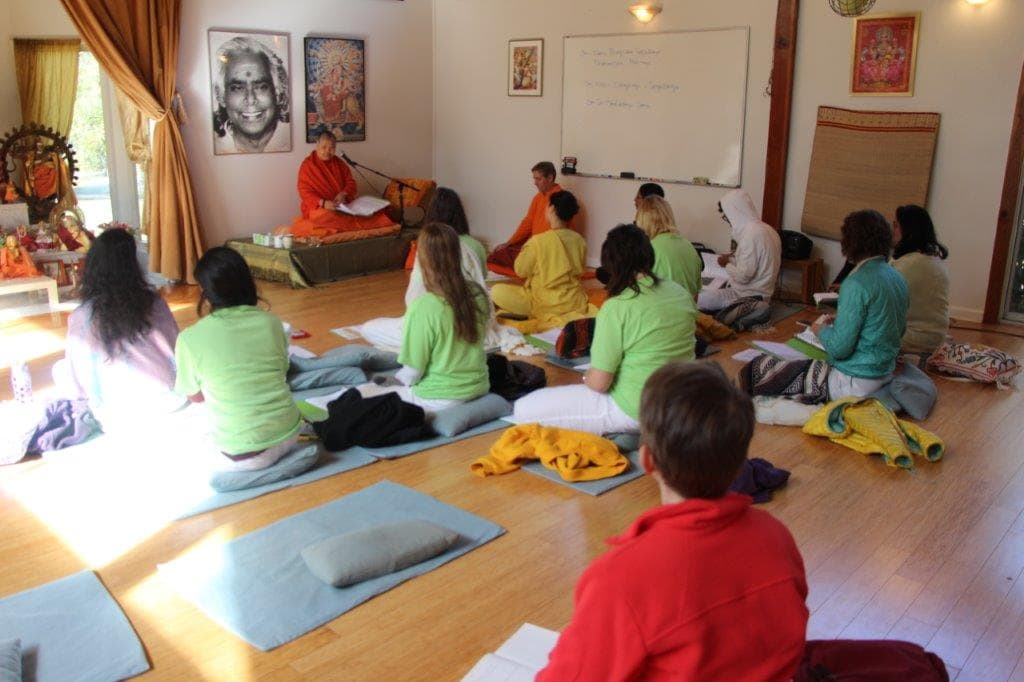
Module 4 – Distance Learning
Having completed Module 1, the Yoga Health Educator begins to pursue the online Distance Learning portion of the curriculum. Distance Learning classes require approximately 2 hours per week in online sessions over the course of 2-year program. Assignments and exams are used to assess the progress of the Yoga Health Educator’s study. Students continue their studies of Anatomy and Physiology, Ayurveda, Therapeutic Relationship and Ethics.
There will be in-depth teaching on the psychological causes of addiction, offering holistic strategies on how to manage addictions and self-destructive behaviors. There will be discussions on Ayurveda practical therapies in relation to the disease of addiction, as well as understanding of the human condition through Yoga and the 12 Steps.
Students will be familiarized with different types of addictions, their medical classification and terminology. During the final distance learning sessions, students will learn the basic principles of the therapeutic relationship, and revisit the ethical principles of a YHE, as well as the legal and the business of Yoga Health Education.
- Anatomy and Physiology Taught by Swami Jnaneswariananda
- Ayurveda Taught by Mary Thompson
- Health and Disease: Addiction Taught by Durga Leela
- Therapist/Client Relations Taught by Mary Thompson
- Business of Yoga Therapy: Legalities and Networking Taught by Swami Dharmananda & Swami Sivasankariananda
- Ethical Principles and Continuing Education Taught by Swami Sitaramananda
Students are required to attend all classes.
Online sessions will be recorded and, with advance permission, may be available in lieu of real-time participation. Note that instructors are subject to change without notice.
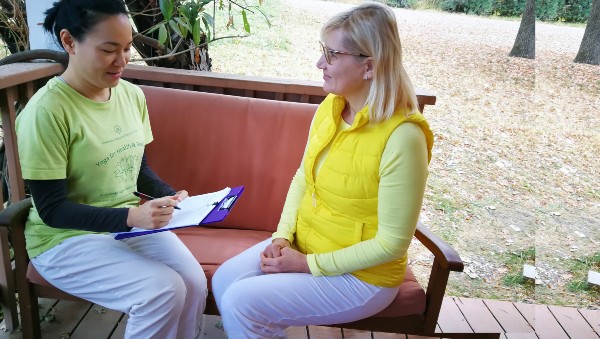
Practicum
Practicum work begins following the 2nd module. Practicing under the supervision of their assigned Mentor, the Yoga Health Educator student meets with participants in one-on-one Yoga Health Consultation sessions (observed and unobserved) and Group retreat sessions.
The Yoga Health Educator will conduct intake and assessment of the participant, develop protocols addressing the participant’s needs, and provide documentation for each case.
Follow-up, re-assessment, and adjustment of protocols to meet the participant’s evolving needs and goals are an essential component of the Practicum and the work of the Yoga Health Educator.
The Yoga Health Educator in-training is required to teach group classes of 3 days or 5 days on specified topics under supervision of the mentor.
Resources
Works by Swami Sivananda and Swami Vishnudevananda on Yoga Practices and Philosophy
Sivananda, Swami, Raja Yoga, (3rd Edition, original work published in 1937), The Divine Life Society, 1999
Sivananda, Swami, The Science of Pranayama, (17th Edition, original work published in 1935), New York, Pocket Books, 2001
Sivananda, Swami, How to Cultivate Virtues And Eradicate Vices (17th Edition), Divine Life Society, 2009
Sivananda, Swami, Karma And Diseases, Divine Life Society, 1959
Vishnudevananda, Swami, The Complete Illustrated Book Of Yoga, (original work published 1960), Random House, 1995
Vishnudevananda, Swami, Meditation And Mantras (original work published in 1978), New York, Om Lotus, 2000
Vishnudevananda, Swami, Sivananda Companion To Yoga, Sivananda Yoga Vedanta Center, 2000
Sivananda Yoga Vedanta Center, Mind And Body, New York, DK Publishing, 1996
Sivananda Yoga Vedanta Center, Practical Ayurveda, DK Publishing, 2018
Sivananda Yoga Vedanta Center, Yoga: Home Practice Companion, 2018
Sitaramananda, Swami, Essentials Of Yoga Practice And Philosophy, Sivananda Yoga Vedanta Centers, 2016
Sitaramananda, Swami, The Deeper Paths Of Yoga Teaching For Healing, Yoga Life, Val Morin, Quebec, Canada
Sitaramananda, Swami, Understanding the Addictive Mind, Yoga Life, Val Morin, Quebec, Cananda
Works by Swami Sivananda on Health
Sivananda, Swami, Health And Diet, (5th edition), Divine Life Society, 2014
Sivananda, Swami, Health And Happiness, (original work published 1950), Divine Life Society, 2014
Sivananda, Swami, Health And Hygiene (7th edition, original work published in 1957), Divine Life Society, 2013
Sivananda, Swami, Practice Of Nature Cure, Divine Life Society,1952
Sivananda, Swami, Radiant Health Through Yoga, Divine Life Society, 1958
Sivananda, Swami, Asthma, Divine Life Society, 1958
Sivananda, Swami, Blood Pressure: Its Causes And Cure, Divine Life Society, 1958
Sivananda, Swami, Boon To Diabetic, (5th edition, original work published in 1950), Divine Life Society, 2005
Sivananda, Swami, How To Get Sound Sleep, Divine Life Society, 2003
Miscellaneous
Kabatzinn, J. Full, Catastrophe Living, Using The Wisdom Of Your Body And Mind To Face Stress Pain And Illness, New York
Luskin, F. Forgive For Good, A Proven Prescription For Heath And Happiness, Sanfrancisco, Harper, 2002
Mate, G. When The Body Says No: Exploring The Stress-Disease Connection, Hoboken, New Jersey, Wiley, 2004
Mate, G. In The Realm Of Hungry Ghosts: Close Encounter With Addiction, Berkley, North California, North Atlantic Books
McClanahan, S.A. Surgery And Its Alternatives: How To Make The Right Choices For Your Health, New York, Kensington
Frawley, D. Vedantic Meditation: Lighting The Flame Of Awareness, Berkley, North Atlantic Books, 2000
Sarkar, D. Yoga Therapy, Ayurveda, And Western Medicine: A Healthy Convergence, Lulu Publishing Service, 2017
McCall, T. Yoga As Medicine: The Yogic Prescription For Health And Healing: A Yoga Journal Book, New York, Bantambell
Coulter, D. Anatomy Of Hatha Yoga, Marlborough, VT, Body and Breath, 2001
Childre, D. Martin, H. The HeartMath: Engaging The Power Of The Heart’s Intelligence, New York, Harper Collins, 1999
Ayurveda and the Diseases Process
Frawley, D. Ayurvedic, Healing: A Comprehensive Guide, Twin Lakes, WI, Lotus Press, 2000
Frawley, D. Ayurveda and The Mind: The Healing Of Consciousness, Twin Lakes, WI, Lotus Press, 1996
Halpern, M. Healing your Life: Lesson On The Path of Ayurveda, Twin Lakes, WI, Lotus Press, 2011
Lad, V. Ayurveda The Science Of Self Healing, (original work published in 1984) Twin Lakes, WI, Lotus Press, 2009
Main Faculty of the SYHET program
Guest Faculty
- Fred Luskin, Ph.D.
- Shani Robins, Ph.D.
- Tara Durga Devi, C-IAYT, RYT500
- Arun Deva, AP, AYT, C-IAYT, E-RYT500
- Catherine O’Neil (Durga Leela) E-RYT 500, C-IAYT
- Bill Sinclair
- Jeff Sims
- Dr. Diep
- Dr. Loan
- Kathleen Haydon
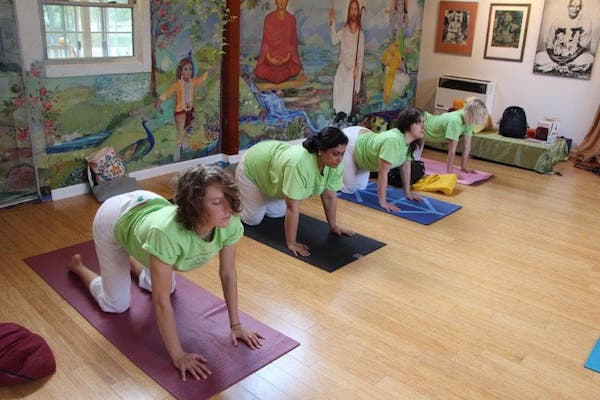
Tuition
2-Year Program Tuition
For 2026 – 2028, the full tuition for the Sivananda Yoga Health Educator Training is $10,000 for online training with additional accommodation fees for the residential option. Deposit at time of application: $1,000 (non-refundable).
Early-bird tuition discount: Pay in full by August 15, 2025 and receive 10% off the tuition.
Payment plans are available for students in need.
Accommodations:
For 2026 – 2028 – both Online & Onsite options are available.
If coming to stay in-person the following prices apply for each of the 17-day modules:
– $600 for dorm option (outdoor bathhouse nearby)
– $750 for double room (with bathroom attached)
– $950 for single cabin (with bathroom attached)
Accommodations include two vegetarian meals per day. Ashram rules and policy apply.
Pre-requisites
The minimum admission requirement for the SYHET program is a 200-hour yoga teacher training, such as a Yoga Alliance 200-hour registered school program (RYS 200) or equivalent. An equivalent training integrates the following categories Yoga Techniques, Anatomy and Physiology (western and eastern), Yoga Philosophy Foundations, Teaching Methodology, and Practice Teaching.
In addition to the minimum yoga teacher training prerequisite, SYHET students must have completed the following, which can be accomplished concurrently:
- One year of teaching experience
- One year of personal practice
Please ask the SYHET coordinator to determine if you qualify.
Certification
Upon completion the students receives a Sivananda Yoga Health Educator Certificate (accredited by IAYT). For IAYT membership, please apply directly with them.
To fulfill the program competencies the student must successfully complete the 3 designated Sivananda Yoga Health Educator modules with examination, plus distance learning along with 250 practicum hours under mentorship.
Sivananda Yoga Health Educator Training Application
Professional 800-Hour Yoga Therapy Program
Testimonials
The SYHET has been transformative. I signed up for the training wanting to infuse Eastern therapy practices into my Western clinical psychology career. After just the first module of the training, I came to realize that the reverse will be true – I will be infusing a bit Western psychology into my Yoga Health Education career.
My favorite moment was witnessing the dialog between Swami Sita and an individual suffering from cancer, who was a patient. It was instructive to hear how Swami Sita diagnosed the patients’ underlying emotional and spiritual challenges and then offered her a specific personalized prescription of Bhakti Yoga. It was inspiring to see how Swami Sita could work in harmony towards helping the patient.
Just finished the second module of the Sivananda Yoga Health Educator-2 year, 800 hours long Yoga Therapy course, with contact, practical & online modules-aiming to bring western medicine & holistic healing techniques of Yoga & Ayurveda together, providing a much needed & balanced approach to health & healing.
Thank You Swami Sita & all the teachers & organizers of this course for putting together this amazing content.
Frequently Asked Questions
Q&A with Swami Sitaramananda
Director of the Sivananda Yoga Vedanta Centres and Ashrams (SYVC) on the US West Coast and in Asia
Q. Why is SYVC only now implementing the Yoga Health Educator Training?
A. The international Sivananda organization has taught the holistic health benefits of classical Yoga for more than 50 years. Today, Yoga is widely known as a powerful way to deal with stress and is recognized as an alternative approach in health and preventative care. The Sivananda Yoga Health Educator Training offers the opportunity to apply the classical Yoga teachings to empower others in their own self-healing.
Q. How will Yoga teachers from schools other than Sivananda benefit from this course?
A. Yoga is universal. Yoga teachers differ in their approach to physical postures, sequences, priorities, outlooks and class curriculum. Sivananda Yoga integrally includes breathing exercises (pranayama), relaxation (savasana), vegetarian diet and positive thinking, meditation (dhyana) and Yoga philosophy (Vedanta). Teachers from other hatha Yoga lineages would especially gain an opportunity to experience immersion to the Yogic lifestyle.
Q. How do I find a job as a Sivananda Yoga Health Educator?
A. The program is constructed following the International Association of Yoga Therapists (IAYT) curriculum. SYVC and IAYT are two well-known Yoga organizations. You will stand out in the alternative health field, backed by these two credible organizations. With this training, you can mediate between health care providers and Yoga schools, either referring to existent Yoga courses or provide courses tailored to your specific interest.
Q. Who can I serve and how do I get clients?
A. There are many possible venues. Bring practical Yoga knowledge into hospitals, health clinics, acupuncture clinics, PT and chiropractic offices, social work, at-risk youth facilities, corporate wellness programs. Serve clients struggling with addiction, stress/anxiety, PTSD (survivors of violence—domestic, sexual, personal or military), depression, nervous system disorders, recovery from injury/surgery, chronic pain, autoimmune disorders, behavioral issues and more. Learn how to create a clientele in the “Yoga Business Practices” module during year two.
Q. How does the Yogic lifestyle complement the health care system?
A. Yoga helps restore the immune system and builds resilience to the effects of stress. It addresses deeper issues related to aspects of life such as:
- karmic issues (deep issues from the past)
- subtle energy flow and blockages
- interdependence between our thinking, our emotions and and our energy and vitality
- direct connection between our consciousness, our sense of meaning of our life, our zeal to live and our capacity of healing
- relationship between beliefs and healing
Attention to these underlying causes of disease can have remarkable results in the effectiveness of treatments.
Q. What if clients do not believe in the astral body or the connection between mind-body-spirit?
A. There are countless modern scientific studies on the therapeutic effects of Yoga in specific incidences of disease. This brings light to the relationship between body-mind-spirit. It is not a question of belief, but rather viewing each individual as a whole and providing healing practices based on one’s specific needs.
Q. What about Sivananda Yoga Health Educator liability?
A. You are required to follow the protocol of the health institute you are affiliated with. If you consult independently, you can obtain any insurance policy with coverage for Yoga teachers.
